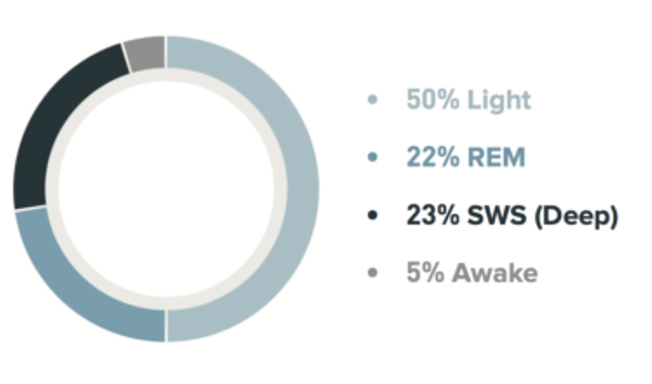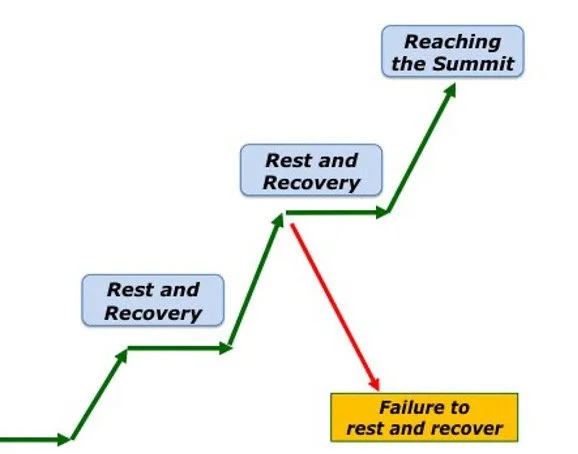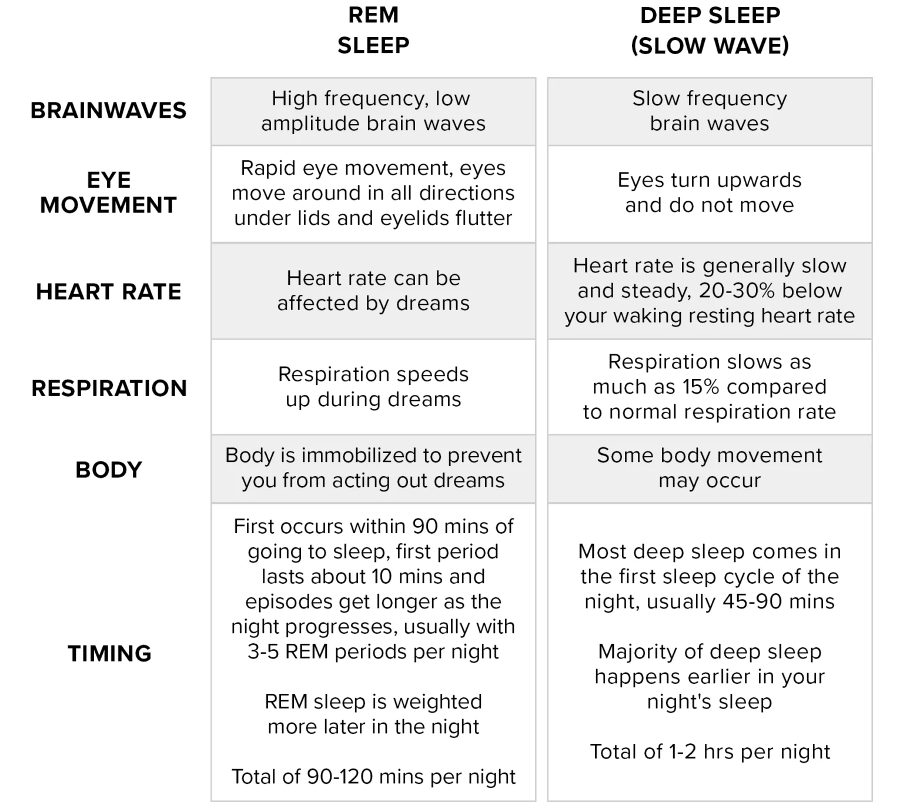The Science of Sleep Success
Do you struggle to get to sleep or feel like the quality fluctuates? Are you tired all the time and feel you're not recovering adequately? Is this interrupting your daily life, work, time with family, friends, mood?
Sometimes we may be aware of the physical symptoms of sleep deprivation, but there’s a lot going on inside the body we may not even realise….
Let’s start with the different stages of sleep:
• Light sleep - Light sleep occurs as you transition to deep sleep. It has minimal restorative impact, and you can be easily awakened during it. Your body is more responsive to its environment in this stage.
• Deep sleep - Deep sleep, known as the “physically restorative” (slow wave) stage of sleep, is when your muscles and tissues repair themselves and cells regenerate. The body produces 95% of human growth hormone during this time. It is often difficult to wake up during deep sleep, and when you do you are likely to feel groggy and disoriented.
• REM sleep - REM sleep is the “mentally restorative” stage, during which your brain converts short-term memories made during the day into long-term ones. The brain is also very active during REM sleep (REM stands for “rapid eye movement”), and your heart rate and respiratory rate increase. Additionally, it is when your most vivid dreams occur.
• Awake - This is included as a stage of sleep because it is normal to be awake for several brief periods of time throughout the night while you are “sleeping.” Referred to as arousals or disturbances and is common to experience as many as 10-20 over the course of a night’s sleep. They only last for minutes at a time and you’re generally not conscious of them, but they can add up to significant sleep loss.
The amount of time a person will spend in each sleep stage varies night by night. In general, a healthy break down to aim for is the following:
So how do you track these numbers exactly? There are various forms of technology now that shares this information – your own personal coach on hand (literally). If you don’t have access to this, then it may be more challenging, and you won’t be able to track accurately. However, think of it this way, if you’re sleeping through the night with limited wake periods, and having deep dreams, waking up feeling refreshed then that’s a good sign! Keep doing what you’re doing.
Not everything is linear. You may have heard this before and I’m going to use it again here. We all want to progress and if something forces us to go backwards, we feel like we’re failing – this is not the case at all. Think of your schedule, I’m sure it changes daily… You work hard, find yourself slumping on the sofa when you get back home, eat a decent meal and go to bed in good time for the day to start all over again. The weekend comes and you’re going for drinks with your friends… jumping straight to that red arrow below. It doesn’t mean you’ve failed or won’t progress again; you’ve just got to be mindful about the frequency of stress put on the body. We’ll go into this a little further down…
DEEP SLEEP VS REM SLEEP
The two can get confused sometimes, so here’s a breakdown of the two:
Deep sleep – Usually occurs in the second stage of sleep, after light sleep. Deep sleep is characterized by a slow, steady heart rate and slow respiratory rate. In deep sleep your heart rate may be 20-30% slower than your waking resting heart rate and your respiratory rate can slow as much as 15% compared to your normal waking breathing rate. Additionally, your body may move during this stage of sleep and your eyes turn upwards under their lids.
Brain waves are also the slowest during deep sleep and therefore known as slow wave sleep (SWS). Deep sleep is the stage where the body restores itself physically. Blood flow increases to help repair muscles and bones, balance metabolism and blood sugar levels, and strengthen the immune system.
REM sleep or rapid eye movement is identified by movement of the eyes under their lids. This is the stage when you may experience vivid narrative dreams that can increase your heart rate and respiratory rate. Your body temperature may also fluctuate. Brain activity in REM sleep is similar to when you’re conscious. During REM sleep your body becomes relaxed and immobile as your brain sends signals to the spinal cord to shut off movement. This creates temporary paralysis in the arms and legs, to avoid the body acting out your dreams. Sleepwalking may happen when this temporary paralysis is disrupted. Sleep apnoea may also be worse during REM sleep because the muscles relax so much. Sleep scientists believe REM sleep is involved in learning, storing memories, and balancing mood. It may heal and restore the brain similarly to the way deep sleep heals and restores the body, preparing both for the day to come. For athletes, it is involved in committing new technical skills to long-term memory.
HOW MUCH REM SLEEP AND DEEP SLEEP DO YOU NEED?
You normally enter deep sleep between 30 minutes and an hour after falling asleep. Your first period of deep sleep usually lasts 45-90 minutes, but time spent in deep sleep generally becomes shorter in the sleep cycles later in the night. The first period of REM sleep usually occurs within 90 minutes of going to sleep. It usually lasts about 10 minutes and episodes get longer as the night processes. The average adult goes through 3-5 full sleep cycles per night typically, totalling 1-2 hours of deep sleep and 90-120 minutes of REM sleep.
THE EFFECTS OF ALCOHOL
Most of us enjoy a glass or two of alcohol and can be healthy in moderation. However, the vast number of studies have shown it impedes our sleep quality. From things like loss of coordination and concentration in the short term, to liver damage, cardiovascular disease and depression in the long term, the list of potential side effects is quite extensive.
Alcohol can directly impact the performance metrics we track like heart rate variability (HRV), resting heart rate, recovery, strain, and sleep. Soon after falling asleep your body usually enters a period of deep sleep, which is the stage of sleep when it restores itself physically. After that, a typical cycle includes time spent in REM sleep, which is the mentally restorative stage (remember that from above? ;)) But, when your body is sedated and must work to process alcohol in its system while sleeping, it is unable to reach these restorative stages and you get a lot of light sleep instead. In that case, even if you sleep for a long time after drinking, you will still fail to wake up feeling rested and recovered. This can then proceed for a few days after depending on the quantity drank, causing slower recovery and fitness gains. Inflammatory markers will also be heightened, so if you have a nagging injury, this will most likely increase inflammation to the area, leading to less repair and growth. Your circadian rhythm may also be impacted…
Average data taken from WHOOP members after drinking alcohol vs not drinking alcohol
WHAT IS CIRCADIAN RHYTHM?
Circadian rhythm is your body’s 24-hour internal clock, which regulates your sleep/wake cycle. The word “circadian” is based on the Latin terms for “around” (circa) and “day” (diem), so your “around-the-day” rhythm dictates the cycles your body goes through–most notably when you wake up and fall asleep. Your circadian clock is controlled by a part of your brain called the hypothalamus that responds to light. As it gets dark, your brain tells your body to begin producing melatonin, which makes you feel tired. Circadian rhythms may vary from person to person, and they also change and evolve with age. Babies, children, teenagers, adults, and elderly people all have different times that their bodies want to eat, sleep, get up, etc. As with anything, it’s about getting to know your body and seeing how these tips can help influence your sleep and wake patterns.
For example, night shift workers will struggle with this. Waking up mid-afternoon and going to bed at 8am. These inconstant behaviours along with poor nutrition can result to unfortunate health problems, not only short term, but also later in life. Other habits that can affect your circadian rhythm include jet lag, staying up late to watch tv and medical conditions (certain medications).
Interestingly, a 2017 Harvard study discovered that students with consistent sleep and wake times had higher GPA’s than others, despite not actually getting more sleep. This data shows that better sleep consistency can help contribute to:
· More REM sleep, the mentally restorative stage of sleep
· Increased slow wave (deep) sleep, the physically restorative stage
· Lower resting heart rate
· Higher heart rate variability (HRV)
· Improved mental health
WHAT ABOUT NUTRITION FOR SLEEP?
From timing, type, and frequency of food consumption, it’s all going to play a role. Many people struggling with sleep, may do anything to try and help i.e., taking every supplement possible, which is not recommended. Some known supplements out there include:
• Omega 3 – anti-inflammatory + regulates norepinephrine levels
• Magnesium – good building block for serotonin
• Valerian – nervous system relaxant
• Chamomile – calming effects of anxiety
• Ashwagandha – stress reliever
• Tryptophan – essential amino acid that helps make melatonin + serotonin (need Na + K balance)
As you can see, many have similar properties, but if you start filling the body with several, you may even be giving your body more work to do and stressing it out further. A little goes a long way! Try introducing certain ones in small doses and see if they have an effect (remember to always consult your doctor when taking something new for the first time and if you’re on any medication, it’s best to check). For example, tryptophan is essential for the body, meaning we can only get it from food sources and the body doesn’t produce it. For those on a vegan diet, it can be trickier to consume as it’s mainly found in meat/fish products. However, it is possible to consume from a variety of nuts and seeds. Something to think about though, because if you struggle to digest these foods, and your sodium/potassium ratio is very unbalanced, it’s harder for the body to take this tryptophan and convert into melatonin and serotonin. As you can see, nutrition is very complex!
Try not to eat too late. I’m sure you’ve all heard that one, but it can ultimately increase blood flow to your digestive tract, causing body temperature to rise. As mentioned previously, you want a nice cool temperature during optimal sleep. It may also be uncomfortable, in turn keeping your mind stimulated when trying to sleep.
Interestingly, a study from University of Chicago showed that shortened sleep caused ghrelin to increase and leptin to decrease by 30%. In turn this could influence the types of food you eat, decision making, and health implications later down the line. Ghrelin is your hunger hormone and leptin is the satiating hormone. Therefore, if hunger signalling is increased and satiating is decreased, you’re more likely to act and eat more food than your body needs. Not only more food, but sugary and processed foods seem to link with this behaviour from sleep deprivation.
TIPS FOR GETTING GREAT SLEEP + IMPROVING SLEEP CYCLES
While there is no simple formula for boosting the amount of time you spend in any of the stages of sleep, there are behaviours you can adopt to give yourself the best chance at an efficient night of sleep. Here are some good practices learned from leading studies:
• Go outside and get some sunlight in the morning as soon as you can after waking up
• Hydrating properly during the day will help you sleep better at night
• Plan consistent times for your meals each day, a scheduled eating pattern reinforces your circadian rhythm
• The darker your room, the better you sleep. Light influences the wake stage of sleep so the darker you can get your room, the more time you will get in the restorative stages.
• Set your room temperature at or around 68 degrees (20 Celsius). You will fall asleep quicker when your bedroom is slightly cool.
• Your bed is not a multi-use space. The more you can train your body to associate your bed with sleep, the more adept you will be at falling asleep in that space. As such, avoid work and leisure time spent in your bed.
• Screens are stimulating and keep you awake. Avoid using your phone or computer in bed, screen time makes it more difficult to fall asleep.
• Set a cut-off time for caffeine intake. Caffeine has a lingering presence for many hours after consumption. For greater sleep efficiency, consciously refrain from caffeine consumption at least 4 hours before bed. I would even go as far as saying at least 8 hours, particularly if you’re caffeine sensitive.
• Plan when you know you’re consuming alcohol. Just as caffeine intake impacts the body hours after consumption, so too does alcohol. Keep this in mind on a night out so that your sleep performance doesn’t suffer.
• Fall asleep and wake up at similar times each day (sleep consistency). Studies have shown it can improve the quality and efficiency of your time in bed.
We hope you found some of this useful. For those who would love to know more and maybe need some support on their sleep/overall health, drop us an email and we’ll be happy to help.
email: hello@riseto.health
REFERENCES
•https://www.nature.com/articles/s41598-017-03171-4
•https://pubmed.ncbi.nlm.nih.gov/32043961/
•https://www.whoop.com/thelocker/new-feature-sleep-consistency-why-we-track-it/
•https://www.whoop.com/thelocker/what-is-rem-sleep/
•https://www.myhealthyprosperity.com/wp-content/uploads/2020/06/Improve-Your-Sleep-Quality.jpeg
•Will Ahmed: Podcast No. 17: The Circadian Rhythm Sleep Hack
•https://www.whoop.com/thelocker/alcohol-affects-body-hrv-sleep/



